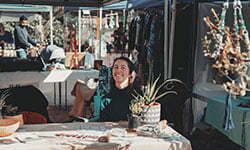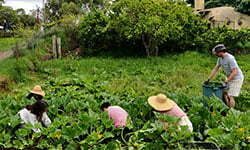A new Swinburne University-led pilot program introduced at CERES Community Environment Park is using water-sensor technology to better manage urban forests.
The sensors are an initiative designed to create healthier and more resilient urban forests where park managers and city residents can follow the progress of the trees via digital platforms that are informed by real-time water use and water-stress data. The real-time water use is measured by the ICT International SFM1 Sap Flow Meters.
Dr Rayburg says it’s the first project of its type in the world.
“These sensors have previously been used in agriculture and plant biology, but never before in an urban forest management setting,” says Dr Rayburg.







